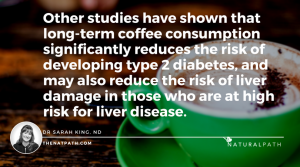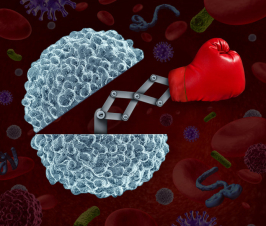Caffeine Metabolism and Much More!
 Many of us crawl out of bed each morning and go straight for a cup o’ joe, infusing delicious caffeine into our bodies, like a car needing gasoline to start its engine. For others, a morning coffee is a ritual. Perhaps it’s the brew, the type of beans, a favourite blend always stocked in the house; Or our simple enjoyment of a comforting hot beverage, leaving us feeling alert, happy, and more energetic. Even more encouraging is the collection of recent studies reporting that coffee drinking is linked to decreased all-cause mortality.1,2,3
Many of us crawl out of bed each morning and go straight for a cup o’ joe, infusing delicious caffeine into our bodies, like a car needing gasoline to start its engine. For others, a morning coffee is a ritual. Perhaps it’s the brew, the type of beans, a favourite blend always stocked in the house; Or our simple enjoyment of a comforting hot beverage, leaving us feeling alert, happy, and more energetic. Even more encouraging is the collection of recent studies reporting that coffee drinking is linked to decreased all-cause mortality.1,2,3
These perks may seem like coffee is a predominantly safe and benign beverage but with any pharmacologically active substance, we need to consider when coffee is helpful versus when it can be harmful.
Certain psychological ailments, medication use, and genetic variations may alter coffee and caffeine’s effects on an individual. As well, women should fully understand the effects of coffee and caffeine during changes in liver detoxification. This occurs with hormonal contraceptive use, pregnancy, and breastfeeding.
The Perks of Coffee
The coffee bean contains thousands of different compounds including antioxidants, such as chologenic acid, and beneficial minerals such as magnesium and potassium. This doesn’t mean that your coffee is now your daily multivitamin, but these compounds can help contribute to your daily recommended intake. For example, there is about 7mg of magnesium in an 8-oz cup of coffee4, which isn’t near enough to elicit a medicinal effect; and the content of antioxidant polyphenols may completely depend on the degree of roasting, with a medium-roast coming out on top.5
The point is that there are benefits to ingesting coffee, but there is no real standardization: The contents of a brewed cup of coffee may be as individual as we are when it comes to caffeine content, and doses of vitamins, minerals and antioxidants. Nonetheless, these compounds likely contribute to the positive health effects observed in these recent studies.5
Other studies have shown that long-term coffee consumption significantly reduces the risk of developing type 2 diabetes, and may also reduce the risk of liver damage in those who are at high risk for liver disease.5 These are huge claims with major implications for chronic disease.
More acutely, we find many athletes using coffee and its caffeine to improve endurance in high-intensity or sustained exercise with positive results.5
When we isolate caffeine, we find that moderate caffeine intake has its own benefits. 100-199mg per day, the amount in about 1-2 cups of coffee, has been shown to be associated with a decreased risk of all-cause and non-cardiovascular mortality. Possible explanations for this effect include stimulation of the metabolic rate, a reduced risk of depression, and the bronchodilation effect of the compound methylxanthine.3
Caffeine
As discussed above, the concentration of compounds within a cup of coffee can vary widely. Caffeine in an 8oz serving (about 240mL) alone may range between 72-130mg.4 A single shot of espresso contains anywhere between 58-76mg of caffeine. These variations are true even of the same type of coffee purchased from the same store on six different days.4
Caffeine acts by stimulating the central nervous system. It increases alertness, wakefulness, performance on memory tasks, and psychomotor reaction time.6 But it also causes an acute elevation of blood pressure, increases heart rate (tachycardia), and is not recommended in those with arrhythmias.3,6
Should this be concerning? Well, it all depends on how much you’re drinking. For many North Americans, 8oz is easily surpassed each day with a typical at-home mug clocking in at about 12oz or 350mL. For comparison, a Starbucks grande measures about 16oz or 470mL. For the most part, 2-3 cups of coffee per day, containing about 300mg of caffeine, has not been shown to be associated with any adverse effects in otherwise healthy individuals.5 Keep in mind that even decaffeinated coffee still contains about 5-15mg of caffeine per 8oz.3
Changes in Liver Metabolism of Caffeine
There are limitations to this otherwise “healthy” hot beverage. Human reproduction carries with it a multitude of changes in metabolism, hormone regulation, circulation, and liver function.
For example, the rate of liver detoxification changes in pregnancy and caffeine cannot be cleared as quickly. This slower metabolism changes how long caffeine stays active in your system. The same can be said about women taking hormonal contraceptives, where taking an oral contraceptive pill will double the half-life of caffeine: on average 8.3 hours longer, and possibly even up to 16 hours longer than usual.6
This can have huge implications for young women, especially those with dysfunctional sleep. For those who are pregnant, a typical pre-pregnancy cup of coffee may now be way too strong for their modified metabolism.
Coffee may also impair absorption of calcium and iron from the gastrointestinal tract.4 For any menstruating woman, where monthly blood loss leads to a loss of iron, understanding this relationship may be vital when trying to increase or maintain iron stores. Recommendations are that iron supplements should always be timed away from coffee.
Caffeine metabolism occurs in the liver by a cytochrome P450 enzyme called CYP1A2. Any genetic variation in this enzyme will affect caffeine clearance.6 As well, genetic variations in adenosine receptors, the receptors that caffeine binds to, can modify caffeine’s effect in the body.6 This might explain why some individuals are abnormal responders to caffeine. For example, those individuals that cannot tolerate any amount of caffeine without being overly wired or anxious; or at the other extreme, those who can easily tolerate a cup of coffee before bed and have it not affect sleep.
Studies in Pre-conception and Pregnancy
We know that caffeine crosses the human placenta5, and as a pregnant woman has changes in her metabolism, a developing fetus has its own limitations as well. Knowing that the half-life of caffeine is extended during pregnancy in the mother, the amount of time that caffeine is active in neonates may surprise you: Because of their immature kidneys and liver, the half-life of caffeine in a fetus is between 65-130 hours.6
Many studies have shown that high doses of caffeine can cause spontaneous abortion and/or impaired fetal growth.6 Even high consumption pre-pregnancy (4 servings daily) has been associated with an increased risk of miscarriage.6 Interestingly though, one study found that 65% of women had an aversion to coffee during their first trimester.
Caffeine may also affect the fetal brain, predisposing offspring for behavioural disorders. One study looked at behavioural outcomes in children of mothers who consumed coffee and caffeine during 15-30 week’s gestation. An association was found with an increased risk of hyperactivity-inattention disorder, conduct-oppositional disorders, and any psychiatric disorder.7 The same amount of tea consumption during gestation was associated with an increased risk of anxiety-depressive disorders.7
Mice models may have one explanation for this though the results are speculative. Caffeine seems to slow the migration of neurons in developing mice due its antagonistic effect on the adenosine type 2A receptor.7 After born, these pups were more susceptible to seizures and displayed more cognitive effects in adulthood.7 This is may not translate as well to human models, but it does warrant further investigation.
It is recommended that women looking to conceive should consume no more than 300mg per day of caffeine.5
Coffee and Caffeine in Breastfeeding
Caffeine ingested by a mother will be present in her breastmilk, detectable within 15 minutes of consumption, and peaking at about 1-hour post consumption.4 Infants younger than 5 months old still have immature detoxification pathways and metabolize caffeine more slowly. This can lead to infant behaviours such as irritability or abnormal sleep disruptions.6
Of further concern is how we understand coffee to disrupt iron absorption, and breast milk is no exception. Coffee consumption in a lactating mother may decrease iron concentration in breast milk and may lead to infant anemia.6
The European Food Safety Authority has concluded that there are no safety concerns for infants when mothers consume less than 200mg of caffeine per day.6 However, mothers may not wish to consume as much caffeine postpartum. Pregnancy often brings with it changes in bladder function with many women reporting increased urgency, frequency, and dribbling. In any individual with overactive bladder or preexisting bladder conditions, caffeine may exacerbate symptoms, causing early urgency and frequency of urination.6
Conclusion
Individual sensitivity to caffeine and coffee must always be considered and will vary. Caffeine is the most widely consumed psychoactive drug in the world and therefore education on its safety of use is an important discussion to have.6 This relates most closely to those who are looking to conceive, those who are pregnant or breastfeeding, women taking hormonal contraceptives, and those with preexisting bladder conditions.
The American College of Obstetricians and Gynecologists recommends a restriction of caffeine intake to less than 200mg per day.5 European standards recommend this same restricted amount during breastfeeding.
References
- Gunter, M.J., Murphy, N., Cross, A.J., et al. “Coffee drinking and mortality in 10 European countries: A multinational cohort study” (2017) Ann Intern Med. 167(4): 236-47
- Park, S.Y., Freedman, N.D., Haiman, C.A., et al. “Association of coffee consumption with total and cause-specific mortality amount nonwhite populations” (2017) Ann Intern Med.167(4): 228-35
- Tsujimoto, T., Kajio, H., and Sugiyama, T. “Association between caffeine intake and all-cause and cause-specific mortality: A population-based prospective cohort study” (2017) Mayo Clin Proc. 92(8): 1190-1202
- Higdon, J.V., and Frei, B. “Coffee and health: A review of recent human research” (2006) Crit Rev Food Sci Nutr.46(2): 101-23
- Bae, J-H., Park, J-H., Im, S-S., and Song, D-K. “Coffee and health” (2014) Integrative Med Research.3(4): 189-91
- Temple, J.L., Bernard, C., Lipshultz, S.E., et al. “The safety of ingested Caffeine: A comprehensive review” (2017) Front Psychiatry. 8:80 doi: 10.3389/fpsyt.2017.000080
- Hyolgaard, M.S., Obel, C., Olsen, J., et al. “Maternal caffeine consumption during pregnancy and behavioural disorders in 11-year-old offspring: a Danish national birth cohort study” (2017) J. Pediatr. pii: S0022-3476(17)30901-0. doi: 10.1016/j.jpeds.2017.06.051. [Epub ahead of print]
Image Copyright: <a href=’https://www.123rf.com/profile_f8studio’>f8studio / 123RF Stock Photo</a>
 Dr. Sarah King is a licensed Naturopathic Doctor, graduating from the Canadian College of Naturopathic Medicine in 2014. Prior to completing her medical studies, she attended Nipissing University where she received her Honors Bachelor of Science in Biology. Sarah has a passion for women’s health and is a birth doula in Durham and Toronto Region. She treats a wide variety of health conditions including menstrual disorders and hormone balancing, fertility, prenatal care, digestive concerns, skincare and mental health/anxiety. Outside the office Sarah is an avid runner with a love of the GTA’s best forest trails. She also continues to improve her yoga practice and teaches breath work as part of stress management counselling to her patients.
Dr. Sarah King is a licensed Naturopathic Doctor, graduating from the Canadian College of Naturopathic Medicine in 2014. Prior to completing her medical studies, she attended Nipissing University where she received her Honors Bachelor of Science in Biology. Sarah has a passion for women’s health and is a birth doula in Durham and Toronto Region. She treats a wide variety of health conditions including menstrual disorders and hormone balancing, fertility, prenatal care, digestive concerns, skincare and mental health/anxiety. Outside the office Sarah is an avid runner with a love of the GTA’s best forest trails. She also continues to improve her yoga practice and teaches breath work as part of stress management counselling to her patients.

















